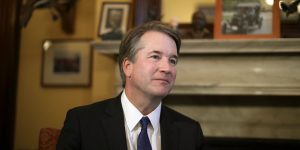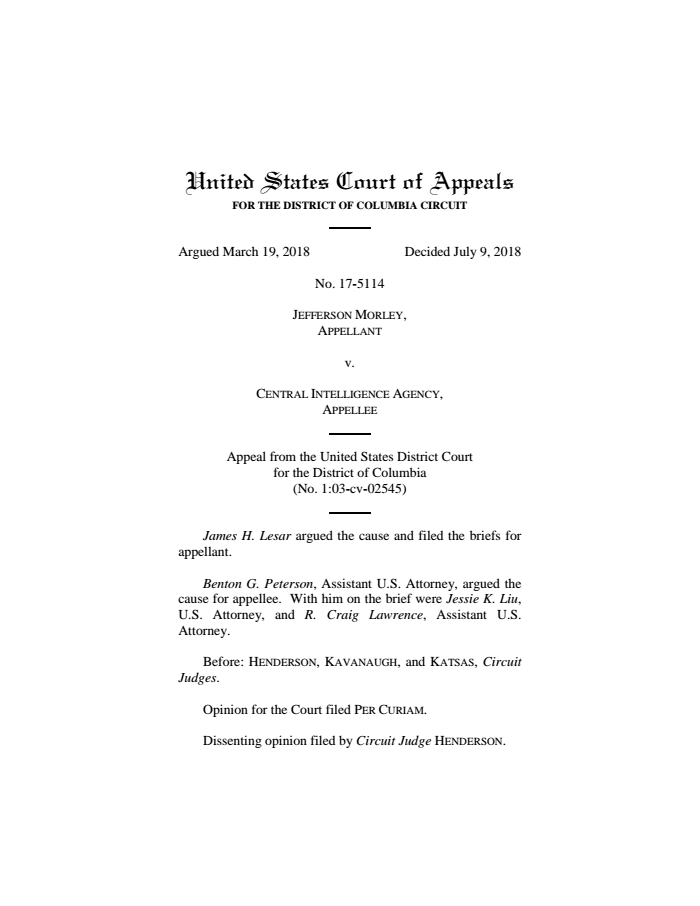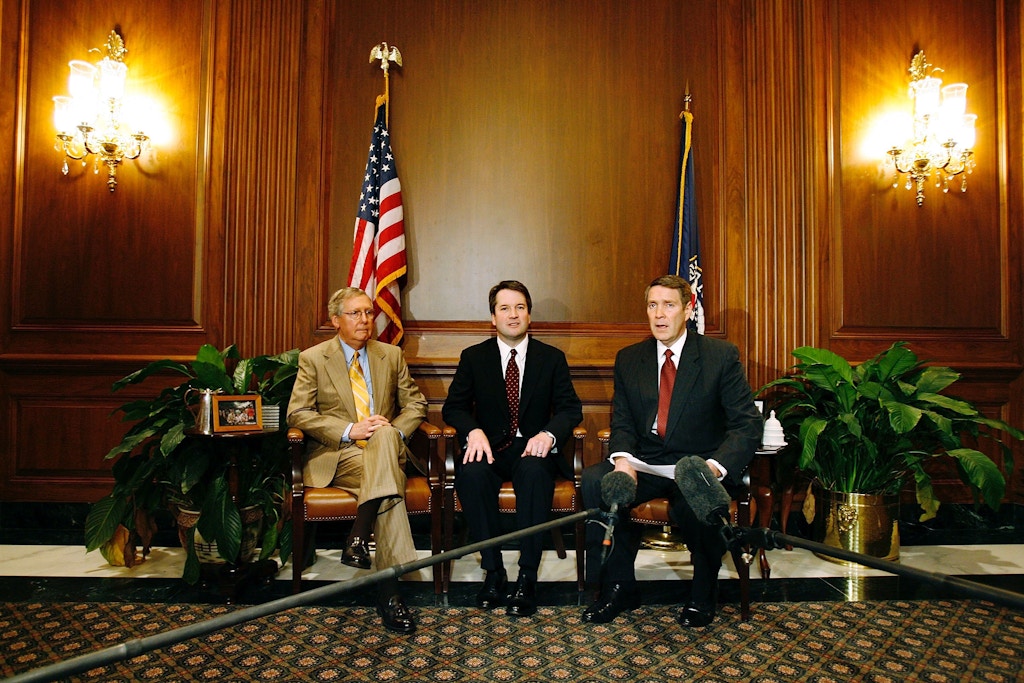That evening, President Donald Trump announced to the world that Kavanaugh was his choice to fill the Supreme Court seat of retiring Justice Anthony Kennedy. In his remarks at the White House event, Kavanaugh touted his “Female Relationship Resume” and declared, “My judicial philosophy is straightforward: A judge must be independent and must interpret the law, not make the law.”
In her tart dissent issued that morning, Henderson, the senior judge in the D.C. Court of Appeals, called that claim into question. She took Kavanaugh to task precisely for a lack of independence and for making law, rather than interpreting it. On the issue of compensation for successful FOIA litigants, Henderson said the prospective Supreme Court justice ignored the letter of the law while siding with a “recalcitrant” CIA over a working journalist — i.e., me — who had uncovered information of genuine public benefit.
Kavanaugh’s ruling in Morley v. CIA was of a piece with his record as an advocate of unbridled executive branch power. His view that at a sitting president cannot be indicted, or even subpoenaed, is well known. Less known is his permissive treatment of the CIA. In my case, as in another key FOIA case from 2014, Kavanaugh ruled that the agency could not be held publicly accountable for its actions — even ones that occurred more than 50 years ago.
Henderson not only dismantled Kavanaugh’s arguments, but her dissent also identified some recurring flaws in his jurisprudence. The source was almost as notable as the document itself.
Henderson is no liberal. She was working as lawyer in private practice in Charleston, South Carolina, when President Ronald Reagan appointed her to the federal bench in 1986. In 1990, President George H.W. Bush elevated her to the D.C. Court of Appeals. She is a conservative who chafes at concepts like abortion rights and immigrant rights. Last October, she joined Kavanaugh in ruling that a pregnant, unaccompanied 17-year-old migrant did not have the right to obtain an abortion while in custody of the Department of Homeland Security.
Henderson faulted her colleague Kavanaugh on impeccably conservative grounds. “
In other instances, Henderson has given the benefit of the doubt to U.S. national security agencies. In 2008, she ruled against four Guantánamo detainees seeking to sue Defense Secretary Donald Rumsfeld for the torture they endured. She dismissed their case with the rather blithe observation that “torture is a foreseeable consequence of the military’s detention of suspected enemy combatants.”
Henderson, however, didn’t give Kavanaugh the benefit of the doubt in Morley v. CIA. Rather, she faulted her colleague on impeccably conservative grounds: his excessive deference to government arguments, which she found unwarranted by facts; his willingness to overlook relevant law, which she found inexplicable; and his willingness to substitute his own opinions for the law, which she found unacceptable. She wrote, “The majority, it appears to me, overlooks the district court’s latest errors in order to ‘bring the case to an end.’”
Henderson’s dissent illuminates Kavanaugh in action: a creative and cavalier judge who is willing to make law — not interpret it —when it comes to ruling in favor of the government.
I had glimpsed Kavanaugh up close several times in the course of my lawsuit, which was filed in 2003. He heard oral arguments from my pro bono attorney Jim Lesar three times, in 2011, 2014, and 2018. In these hearings, he struck me as an engaged jurist with an agile mind. He asked incisive questions. In his subsequent written decisions, I could discern his judgment on how FOIA law applies to issues of journalism, transparency, and national security. He was conservative, but smart and seemingly open to opposing arguments. I had harbored hopes that he might rule in my favor, but his agility was more opportunistic than independent.
A review of the “protracted history” — Henderson’s phrase — of the case shows why. In Morley v. CIA, I sought the records of a deceased undercover CIA officer, George Joannides. Based on extensive interviews with his former Cuban-American associates, I knew Joannides was working undercover out of Miami in 1963 and had some knowledge about events leading up to the assassination of John F. Kennedy. Joannides had also served as the agency’s liaison to congressional investigators who re-opened the JFK investigation in 1978.

CIA officer George Joannides, left, receives a Career Intelligence Medal in 1981 from deputy CIA director Bobby Ray Inman. (Photo: CIA)
In 2004, the CIA responded by giving me a small batch of documents from Joannides’s personnel file. Beyond that, the agency asked for summary judgment to block any further releases, which was promptly granted by District Court Judge Richard Leon, a George W. Bush appointee. Lesar filed an appeal on my behalf, contending that the CIA had not conducted the searches required by law.In December 2007, a three-judge panel — including Henderson — upheld most of Lesar’s arguments. The judges unanimously agreed that the agency’s actions had failed to follow the Freedom of Information Act on no less than seven different points of law. The court ordered the CIA to reconsider its response and conduct additional file searches. Nine months later, the CIA gave me an additional 500 pages of documents, including photographs of Joannides receiving a Career Intelligence Medal, one of the agency’s highest honors.
I appealed, seeking still more documents. In April 2012, another three-judge panel — this time including Kavanaugh — ruled my arguments were without merit and the case was closed, at least on the issue of what documents would be released.
Yet I had one more argument. The case law around the FOIA holds that when a plaintiff “substantially prevails” over the government, they are entitled to have their court costs paid by the defendant. So I filed a motion for the government to pay my court costs, namely compensation for Lesar.
A veteran FOIA litigator, Lesar often takes difficult cases on a contingency basis for working journalists or public interest causes, gambling that if he wins, the government will pay his fee. His clients have included well-known authors and veteran Washington journalists. In Morley v. CIA, he had merely bested a squadron of CIA and Justice Department lawyers with three-piece suits and six-figure salaries. I thought he should get compensated, and the law indicated the same.
The CIA refused, claiming there was little “public benefit” to the new information generated by the lawsuit. Leon, the district court judge, agreed. I appealed again, thinking my case was strong. By then, the lawsuit had been covered by the New York Times and Fox News. The Associated Press New York office had compiled a long report on still-secret JFK records, including the Joannides files, which ran in 30 news outlets across the country, including the San Diego Union, St. Paul Pioneer Press, and CBS News in Dallas. The Times and at least six other news sites published the photo of Joannides receiving his medal, which the CIA had only coughed up under judicial order. In short, many news editors thought the information I had found would benefit their readers. I expected that would count for something.
Kavanaugh served on the three-judge panel that heard oral arguments on the issue in 2014. He and two other judges agreed that Leon had failed to apply a four-factor test of “public benefit,” established in previous FOIA cases. The test balances the value of the information sought or obtained for an informed citizenry, the plaintiff’s commercial interests, and the government’s actions. Leon, they found, had improperly relied on only one factor: His belief that the release of Joannides files had added nothing of substance to the JFK assassination story. The appellate court sent the case back.In March 2017, Leon shuffled his thoughts and once again ruled that there was no “public benefit” from my case. I again appealed, and, a year later, I finally had my day in court. On March 19, 2018, a new three-judge panel consisting of Kavanaugh, Henderson, and the newcomer Katsas heard the latest round of arguments in the federal courthouse in Washington. By that time, Kavanaugh knew that his name was on Trump’s November 2017 short list of candidates to fill the next Supreme Court vacancy.
Kavanaugh was his usual brisk self in the hearing. He gaveled from the center seat while Henderson listened remotely by telephone, and the forlorn Katsas looked on, perhaps bewildered by the complexity of a case infused with the conspiratorial overtones that inevitably shroud any public discussion of the JFK story. Kavanaugh closely questioned Lesar, while Henderson corrected the government attorney Benton Peterson on a point of fact. After 30 minutes of questions, the hearing was over.
Kavanaugh’s decision could not be considered a surprise. He had sided with the CIA before.
The three judges deliberated for three and a half months. They filed a split decision on July 9 that was delivered per curiam — “by the court” in Latin — denoting an unsigned opinion usually reserved for unanimous or collective decisions. It was an odd designation for a decision contested by the senior judge on the Court of Appeals, but the label spared Kavanaugh from having his name on a pro-CIA decision on the same day as a big announcement. Five hours after the opinion was filed, Kavanaugh stood beaming with his wife and daughters in front of the TV cameras as Trump announced his nomination for the Supreme Court.
Kavanaugh’s decision could not be considered a surprise. He had sided with the CIA before. In 2014, he ruled against the nonprofit National Security Archive in a prolonged FOIA lawsuit over an internal history of the failed 1961 CIA operation at the Bay of Pigs. Kavanaugh, in a 2-1 ruling, agreed with CIA and Justice Department lawyers that the document was a “draft,” and its release would “expose an agency’s decision-making process in such a way as to discourage candid discussion within the agency and thereby undermine the agency’s ability to perform its functions.”
Kavanaugh was referring to a study that was 50 years old. Congress quickly overturned his decision with legislation mandating that such histories be released after 25 years.
In my case, Kavanaugh ruled for the CIA again.
“This FOIA case has dragged on for a staggering 15 years,” the majority opinion began, a line that seems likely to have been written by Kavanaugh, given Katsas’s recent arrival on the bench. “The litigation over attorney’s fees alone has taken eight years. It is time to bring the case to an end.”
The CIA had acted “reasonably,” he said. The word recurred 15 times in the opinion. The words “reasonable” and “unreasonable” showed up 24 times. The CIA had been reasonable, Kavanaugh wrote, while depicting me as a modestly paid scrounger who was wasting the court’s time over claims of “minimal” interest about the JFK assassination. He said nothing about the JFK Records Act as a unanimous expression of Congress in support of full disclosure or about the mainstream media coverage of the lawsuit as a possible public benefit.
In her tightly argued dissent, Henderson wasted no time in blasting Kavanaugh’s insinuations.
“Over the past 15 years, we have remanded this case four times,” she declared. “During the same period, we have reversed the same district court twice in a nearly identical Freedom of Information Act (FOIA) cases. That makes six opinions from this court. I share the majority’s displeasure at the resulting waste of judicial resources, especially because ‘fee litigation [is] one of the last thing lawyers and judges should be spending their time on,’” she wrote, citing one of her old decisions in a separate case. Henderson added, “Jefferson Morley, however, is not to blame for this ‘staggering’ saga.”
Henderson pointed out that the court’s 2013 remand order found that I had already met the standard of “public benefit” established in case law. She quoted that decision at length and went on to briefly outline some key points in my case, namely, the connections between Joannides, an anti-Batista-turned-anti-Castro Cuban exile group called Directorio Revolucionario Estudiantil, and accused JFK assassin Lee Harvey Oswald:
Morley’s request had potential public value. He has proffered — and the CIA has not disputed — that Joannides served as the CIA case officer for a Cuban group, the DRE, with whose officers Oswald was in contact prior to the assassination. “
She noted that the court had also “previously determined that Morley’s request sought information ‘central’ to an intelligence committee’s inquiry into the performance of the CIA and other federal agencies in investigating the assassination. “
“In other words,” the exasperated Henderson wrote, “we held that Morley satisfied the public-benefit factor in this case.”
“To me, the CIA’s multiple flawed legal positions suggests that it was ‘recalcitrant’ in declining to produce any documents before being sued.”
By ignoring this finding, Henderson went on, Kavanaugh ultimately depended on repeated assertions that the CIA responded “reasonably” to my inquiries. Yet, Henderson noted the appellate court’s 2007 decision found the agency’s initial response to my FOIA request was deficient on seven different legal points. Kavanagh had decided in favor of an agency that had flouted the law, she concluded.
“To me, the CIA’s multiple flawed legal positions suggests that it was ‘recalcitrant’ in declining to produce any documents before being sued,” Henderson wrote.
While Kavanaugh had shot me down, I could take Henderson’s closing words as a moral victory. She wrote:
This case does not call for “[d]eference piled on deference.” … It calls for an adherence to … our four earlier Morley opinions. Because I believe the district court ignored our mandate and misapplied our precedent, I would vacate the district court order a fifth time and remand with instructions to award Morley the attorney’s fees to which he is entitled. “
Henderson’s dissent stands as a warning from a civil and conservative colleague about Supreme Court nominee Brett Kavanaugh. She has identified a strain of recklessness in Kavanaugh’s cynical jurisprudence. She wrote that, in his opinion with Katsas, Kavanaugh had “ignored our mandate and misapplied our precedent.”
Top photo: Judge Brett Kavanaugh listens to Sen. Rob Portman, R-Ohio, talk about Kavanaugh’s qualifications before a meeting in the Russell Senate Office Building on July 11, 2018, in Washington, D.C.
RELATED: Kavanaugh and Katsas Ruling in Morely v CIA 14 pages
RELATED: Henderson Dissent in Morely v. CIA – The Intercept



